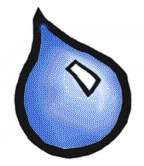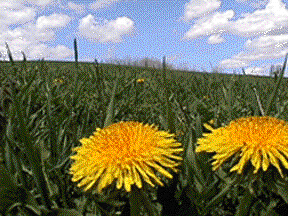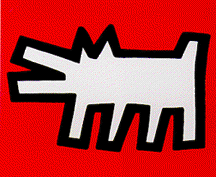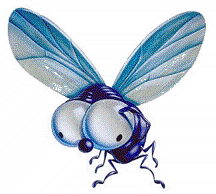
Well, maybe not. Summer's hot, humid weather
can make the best of us feel a bit wilted. The following tips
will help keep your cavy more comfortable and cool. This article
was originally written for my Minnesota-based newsletter, but
the hot weather tips should be helpful for other parts of the
country as well.
Cold Beverages
Cavies usually drink much more water when
they are hot. Water must always be available, and as fresh as
possible.
|
 |
I recommend changing water at least twice
daily during hot weather. Bottles get slimy quicker when it's
hot, so keep a bottle and tube brush handy for weekly cleaning.
If your cavy is playfully emptying water from his bottle onto
the cage floor (the brat!), try putting a 4"-5" diameter
ceramic crock under the drinking tube. This will save bedding
from extra soaking. The crock will need to be dumped out a couple
times daily. If you are putting a vitamin C supplement in the
water, it may be weakening faster. Light, heat and minerals in
the water weaken vitamin C. You might want to mix up fresh vitamin
C water twice daily. Multi-vitamin supplements are not recommended.
Summer 'Salad'
 |
Wild South American cavy cousins dine
chiefly on grass. Fresh grass and dandelion leaves are great
for our pampered cavies -- but only if it is completely chemical-free.
|
No fertilizer, no weed-killer, no nothin'!
Cavies are extremely sensitive to these chemicals and can be
poisoned by them.
Bad Hair Day
Some cavies shed profusely during the
summer months.
 |
Frequent combing or brushing will remove
loose hair. I prefer to use a metal "greyhound comb"
with medium and fine teeth. Longhaired cavies may appreciate
a haircut.
|
Bathing every few weeks with a mild pet
shampoo will also help your cavy feel more comfortable by removing
loose hair and debris, plus cleaning and conditioning the skin.
Skin and fur bugs may be more active during hot weather. While
grooming your cavy watch for signs of skin irritation or coat
damage. If problems are noted you may need your cavy examined
by a veterinarian to determine the cause and treat as necessary.
Vacation
While making vacation plans, don't forget
your cavy. Do you have somebody reliable to keep your pet comfortable
and safe while you are gone? Your veterinarian may be able to
board your cavy, or refer you to a professional petsitter. Petsitters
will visit your home once or twice daily to care for your pet
as per your instructions. They can also water your plants, take
in your mail, etc.
Boarding kennels are an option if they
can house your cavy away from the noise and stress of the dog/cat
area, and can guarantee holding/cuddling time.
|
 |
Trusted friends or relatives can prove
invaluable as pigsitters. For additional leads check the yellow
pages, local want ads under "Pets" or "Services",
nearby veterinary clinics or groomers, and referrals from friends
or acquaintances.
Whoever you choose, be sure to leave detailed
written care instructions, adequate supplies, your veterinarian's
phone number and location, and a phone number where you can be
reached - or arrange times you will call the sitter. Ask your
sitter to be very aware of whether your cavy is eating and drinking,
and to let you know if he isn't. Be sure your veterinarian knows
you will be out of town and they may have to deal with your petsitter
in the event of a pet emergency.
Housecleaning
Heat, humidity, increased water consumption
and urination all contribute to making your cavy's cage noticeably
more pungent than usual. Cleaning the cage more often will keep
your cavy's life, and your home, comfortable and pleasant.
If you find tiny flying bugs (like fruit
flies) lurking in the corners of the cage pan, don't panic. Nobody
wants bugs in the house, but these are harmless and short-lived.
|
 |
Here in Minnesota anyway, they are generally
active only during the most hot, humid part of the summer. Warm
moist areas - like soggy parts of the bathroom, over-ripe fruit
or overwatered plants, and wet cage corners - attract them. Rinsing
out cage pans after each cleaning helps.
Outdoor Activities
Many cavy owners enjoy letting their pet
picnic outside on the lawn. If well supervised and protected
this can be a lot of fun. Beware of domestic and wild predators
("hmmm, what is this tasty morsel?"), unsafe weather
conditions (heat, rain, strong wind), toxins on the lawn, poisonous
or hard to digest plants and weeds, escapes, and any other danger
just waiting to befall an unsuspecting cavy. Also watch that
your cavy doesn't "pig out" excessively on grass. Too
much when he isn't used to it can cause diarrhea.
Danger Zone
 |
When temperatures are up around 80°F
and higher, cavies are at risk for heat stress or heat stroke.
|
Putting a sock covered can of cold soda
or "blue ice" in the cage provides something to cool
off against on especially hot or humid days. A fan will help
circulate and cool the air, but don't aim it directly on the
cage.
Cavies may become less active during a
heat wave and nap more (wish I could do that). That's OK. Signs
that a cavy is uncomfortably hot are: rapid breathing, eats much
less - drinks much more, restlessly flops around in the cage
trying to find a "good spot". For this, offer the cavy
fresh cold water immediately, maybe even in a shallow bowl. Spray
him lightly with cool (not cold) water, perhaps rinse his feet
in cool water. Try offering refrigerated pellets or fresh food
that has been rinsed in cold water. Move him to a cooler part
of the house. If he doesn't perk up quickly call a veterinarian
for advice.
A cavy that is drooling profusely or has
pale mucus membranes (check inside the mouth for color) is dangerously
heat stressed. A cavy that is limp, unresponsive and feels hot
to the touch is in critical danger and suffering heat stroke.
The body temperature must be lowered by carefully holding the
cavy in a tub or bowl of cool (not cold) water. Call a veterinarian
or animal emergency clinic immediately for further instructions.
Beat the Heat
If your pampered pet lives in a home that
is air conditioned most of the summer, many of these summer problems
will not apply. Air conditioning is a wonderful invention, but
avoid blowing that wonderful cool air directly on the cavy. His
cage should not be close to, or in front of, wall or window units
- or air vents if you have central air. A towel placed over the
top and side of the cage facing the air conditioner will help
block out too much of a good thing.
 |
Summer is short (well, here in the Midwest
anyway) - so enjoy, be careful, have fun!
|
This article and the JPGPR.com
logo are © 1993-2003 Vicki Palmer Nielsen - Jack Pine Guinea
Pig Rescue. No copyright is asserted herein regarding the illustrations
accompanying the article; copyrights, if any, of the illustrations
are retained by the original holders. If you would like to reproduce
anything from the website, please first e-mail Vicki for permission at
:

|









